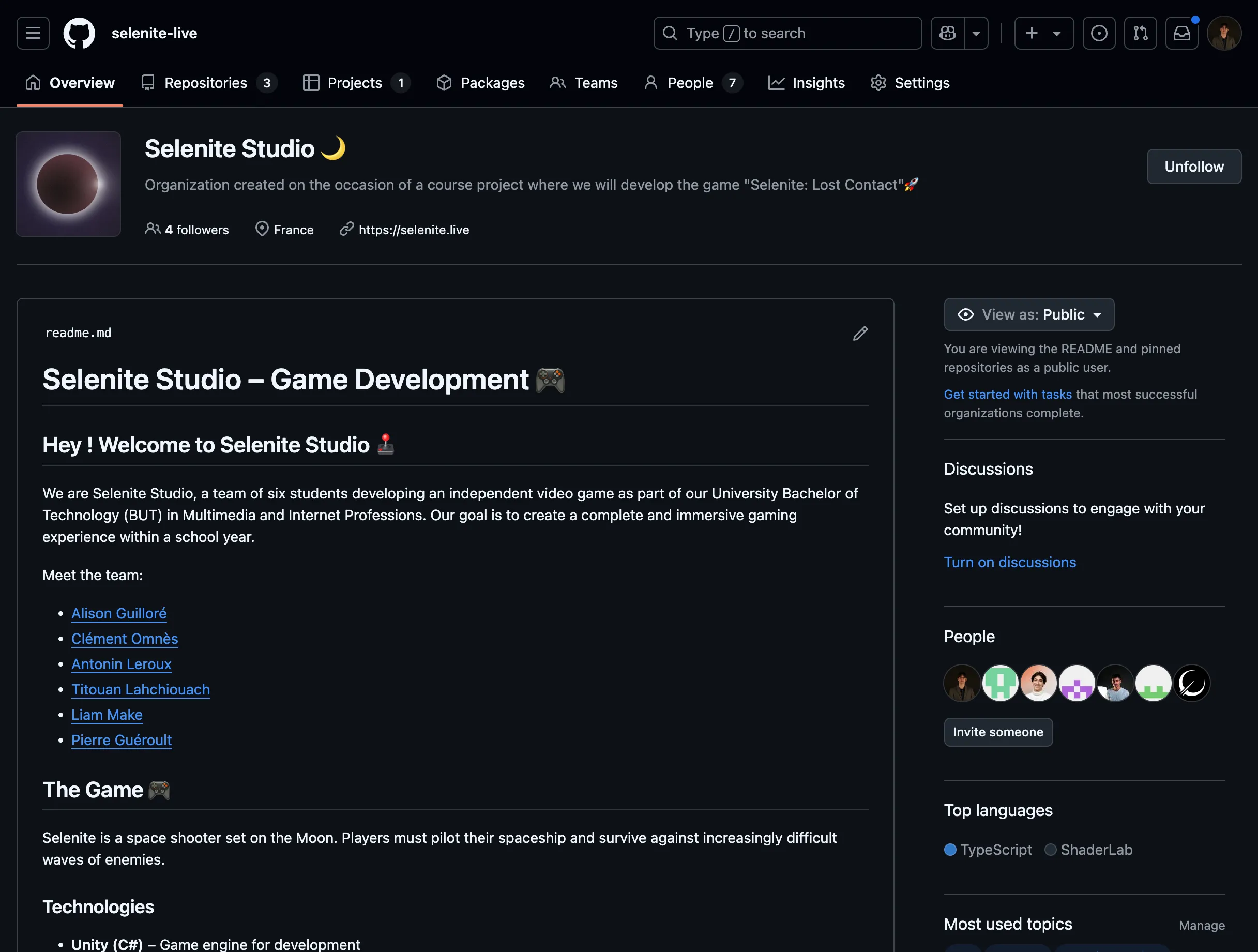Selenite: Lost Contact - My contribution to the game development
Traduction en cours...
Cette page n'est pas encore disponible en français, mais j'y travaille ! En attendant, vous pouvez la lire en anglais ou revenir plus tard pour la version traduite.
Selenite: Lost Contact is an ambitious game project that required a solid development infrastructure. My role in this project focused on setting up and managing the GitHub repository, implementing CI/CD pipelines, and ensuring smooth release management.
Setting Up the GitHub Repository
To facilitate collaboration, I created the main repository for the game on the Selenite GitHub organization . This repository serves as the central hub for contributions, issue tracking, and project organization.


Implementing CI/CD for Automated Builds & Releases
One of the most critical aspects of the development workflow was automating the build and release process. I implemented a CI/CD pipeline using GitHub Actions to build the game for both Windows and macOS. This setup ensures that every new release is built, packaged, and published automatically.
CI/CD Pipeline
Below is the GitHub Actions script used for building and releasing the game:
name: Build the game Windows & MacOS 🎮
on:
push:
branches:
- release
workflow_dispatch:
permissions:
actions: write
contents: write
packages: write
releases: write
jobs:
init-data:
name: Set the workflow data 📊
runs-on: ubuntu-latest
outputs:
builder_number: ${{ steps.builder_number.outputs.build_number }}
date: ${{ steps.set_date.outputs.date }}
steps:
- name: Get the number of the current build
id: builder_number
uses: einaregilsson/build-number@v3
with:
token: ${{ secrets.GITHUB_TOKEN }}
- name: Get the current date for the build name
id: set_date
run: echo "::set-output name=date::$(date +'%Y-%m-%d')"
buildWindows:
name: Build the game for Windows 🪟
runs-on: ubuntu-latest
needs: init-data
steps:
- name: Checkout the code 🛎️
uses: actions/checkout@v4
with:
fetch-depth: 0
lfs: true
- name: Build Unity Project for Windows
uses: game-ci/unity-builder@v4
env:
UNITY_LICENSE: ${{ secrets.UNITY_LICENSE }}
UNITY_EMAIL: ${{ secrets.UNITY_EMAIL }}
UNITY_PASSWORD: ${{ secrets.UNITY_PASSWORD }}
with:
targetPlatform: StandaloneWindows64
unityVersion: 2022.3.42f1
- name: Upload the build
uses: actions/upload-artifact@v4
with:
name: build-StandaloneWindows64
path: build/StandaloneWindows64
buildMacOs:
name: Build the game for MacOS 🍏
runs-on: ubuntu-latest
needs: init-data
steps:
- name: Checkout the code 🛎️
uses: actions/checkout@v4
with:
fetch-depth: 0
lfs: true
- name: Build Unity Project for MacOS
uses: game-ci/unity-builder@v4
env:
UNITY_LICENSE: ${{ secrets.UNITY_LICENSE }}
UNITY_EMAIL: ${{ secrets.UNITY_EMAIL }}
UNITY_PASSWORD: ${{ secrets.UNITY_PASSWORD }}
with:
targetPlatform: StandaloneOSX
unityVersion: 2022.3.42f1
- name: Upload the build
uses: actions/upload-artifact@v4
with:
name: build-StandaloneOSX
path: build/StandaloneOSX
publishAsRelease:
name: Publish the build as a release 🚀
runs-on: ubuntu-latest
needs:
- buildWindows
- buildMacOs
- init-data
steps:
- name: Create a release
id: create_release
uses: actions/create-release@v1
env:
GITHUB_TOKEN: ${{ secrets.GITHUB_TOKEN }}
with:
tag_name: build-0.0.${{ needs.init-data.outputs.builder_number }}
release_name: "v0.0.${{ needs.init-data.outputs.builder_number }}"
body: |
Selenite : Lost Contact
> Release v0.0.${{ needs.init-data.outputs.builder_number }} / ${{ needs.init-data.outputs.date }} 🚀
draft: false
prerelease: false
[Insert Diagram: CI/CD Workflow Overview]
Managing Releases
With the CI/CD pipeline in place, every build is automatically packaged and published as a new release on GitHub. This ensures that developers and testers always have access to the latest stable version of the game.
The release workflow:
- Detects new changes pushed to the
releasebranch - Builds the game for both Windows and macOS
- Uploads the build artifacts
- Publishes a new GitHub release with versioning
You can check out the latest releases here: Selenite: Lost Contact Releases

Conclusion
By setting up a structured GitHub repository, implementing a robust CI/CD pipeline, and managing automated releases, we ensured a streamlined development workflow for Selenite: Lost Contact. These technical foundations allow developers to focus on improving the game while maintaining an efficient and reliable release process.
This project highlights my expertise in DevOps, CI/CD pipelines, and GitHub repository management. If you’re interested in learning more or collaborating, feel free to reach out!
Check out the link below to visit the official website of Selenite, or explore the GitHub repository for the game.